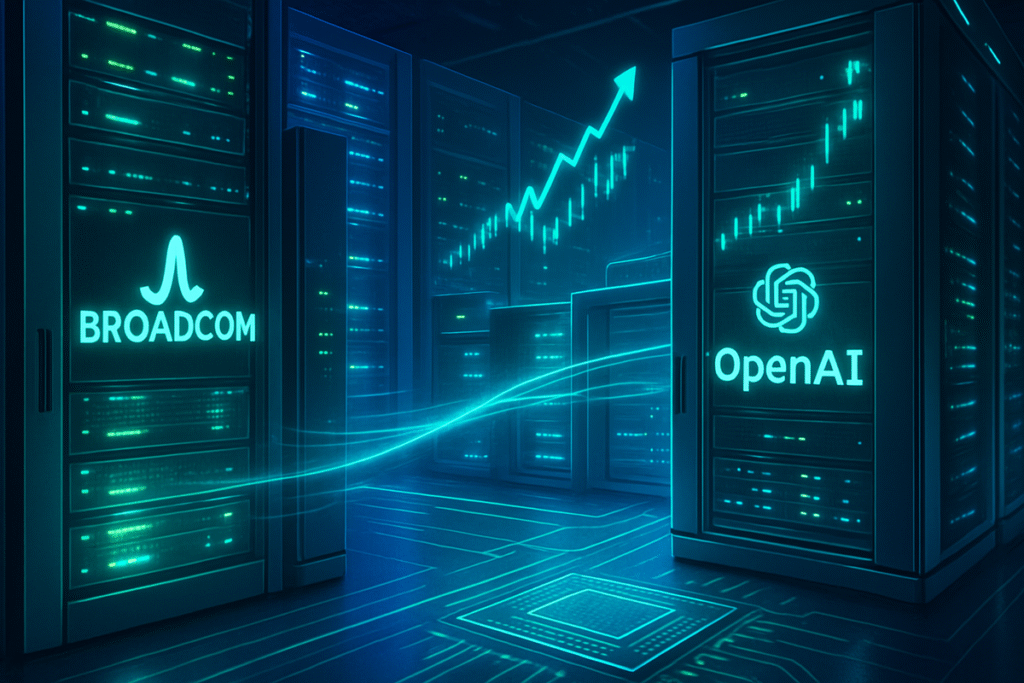OpenAI has partnered with Broadcom in a landmark agreement to secure a 10-gigawatt chip supply, a deal that is expected to accelerate advancements in artificial intelligence hardware. The collaboration represents a major step forward for both companies and the broader AI industry.
The deal comes as demand for AI computing power continues to surge. OpenAI, known for developing cutting-edge AI models, requires significant hardware resources to train and operate its systems. Broadcom, a leading semiconductor manufacturer, will provide the high-capacity chips needed to meet these growing computational demands.
Industry experts say this partnership could reshape the AI hardware landscape. The scale of the chip supply is unprecedented, signaling a long-term commitment from both companies to expand AI infrastructure. This supply will support OpenAI’s ongoing research initiatives and commercial applications, including large-scale AI model training and deployment.
The agreement highlights the increasing importance of hardware in AI development. While software and algorithms often receive the most attention, the underlying hardware is critical for efficiency and performance. High-capacity chips enable faster computations, improved model accuracy, and more reliable AI services.
Broadcom’s role in the partnership is central. The company will supply specialized semiconductors designed for AI workloads, including high-performance processors and memory components. These chips are tailored to handle the massive data throughput required by modern AI models, ensuring that OpenAI can scale operations effectively.
The deal also reflects broader trends in the technology sector. As AI adoption accelerates across industries, companies are investing heavily in specialized hardware. Cloud providers, research institutions, and AI startups are all seeking high-performance chips to support data-intensive applications, from natural language processing to computer vision.
OpenAI’s collaboration with Broadcom is expected to have economic and strategic implications. The scale of the chip supply strengthens supply chain resilience, ensuring that AI development can continue without hardware shortages. It may also inspire other AI companies to secure similar long-term agreements, further fueling competition and innovation in the semiconductor industry.
Experts emphasize that this partnership is not just about quantity but also quality. Broadcom’s chips are designed to optimize AI workloads, improving efficiency and reducing energy consumption. These advances are crucial for sustainable AI development, as large-scale models require significant power to operate.
In addition to supporting research, the chip deal may accelerate commercial AI solutions. OpenAI is likely to expand its offerings in areas such as AI-powered tools, enterprise solutions, and cloud-based services. The availability of high-capacity chips ensures that these products can perform at scale, meeting growing market demand.
The collaboration also demonstrates the strategic alignment between software and hardware developers. By securing a reliable chip supply, OpenAI can focus on innovation in AI models while relying on Broadcom for the physical infrastructure needed to support growth. This synergy is increasingly common in the AI sector, where partnerships between hardware manufacturers and AI developers are critical for progress.
Analysts predict that the OpenAI Broadcom chip deal will influence global AI development trends. Companies worldwide may accelerate hardware investments to remain competitive, particularly in regions investing heavily in AI research and industrial applications.
The partnership underscores the growing interdependence of AI and semiconductor industries. As AI technologies evolve, companies must balance software innovation with hardware capability. OpenAI’s agreement with Broadcom represents a significant milestone, illustrating how strategic collaborations can drive technological advancement.
Overall, the OpenAI Broadcom chip deal positions both companies at the forefront of AI hardware development. With a 10-gigawatt supply secured, OpenAI can continue scaling its AI models, while Broadcom strengthens its role as a key provider of advanced semiconductors. The collaboration marks a pivotal moment in the ongoing expansion of AI technology worldwide.


